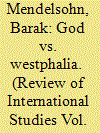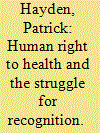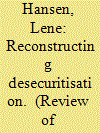|
|
|
Sort Order |
|
|
|
Items / Page
|
|
|
|
|
|
|
| Srl | Item |
| 1 |
ID:
113300


|
|
|
|
|
| Publication |
2012.
|
| Summary/Abstract |
This article presents the operation of al-Qaeda and Hizb ut-Tahrir, two of the most radical Islamist movements, through the lens of the relationship between religion as an organising principle for world politics and the state-based logic. It examines these groups in the context of repeated attempts by religious actors throughout history to render religion the dominant and constitutive element in world politics. Prior to the Peace of Westphalia, religion had a critical role in shaping the political landscape, but Westphalia relegated religion to a secondary position. While it accepted religion's role in the domestic affairs of the units in the international system, the Westphalian order kept religion subordinated to the logic of the state system. But religion maintained its ability to provide an alternative organisation for world politics. While al-Qaeda and Hizb ut-Tahrir are highly unlikely to bring about systemic change, their ascendance should remind scholars that the existing order is not inevitable and that the resurgence of religion in international politics also involves the resurrection of interpretations of religion that compete with and challenge the logic of the state-based system.
|
|
|
|
|
|
|
|
|
|
|
|
|
|
|
|
| 2 |
ID:
113299


|
|
|
|
|
| Publication |
2012.
|
| Summary/Abstract |
Persistent health inequalities exist globally, affecting high-income countries and blighting the developing world. Health inequalities currently are one of the greatest challenges facing realisation of the human right to health. This article argues that the struggle for the right to health in the face of such inequalities requires embracing three critical considerations: redistribution, representation, and recognition. While the analysis of the right to health has been formulated predominantly around theories of distributive justice, I suggest that a more normatively compelling account will link the politics of economic redistribution to the politics of sociocultural recognition. A recognition approach, which views rights claims as grounded on the vulnerability of the human condition, can show how rights are emergent in political action and that the ability to claim and exercise the human right to health is contingent upon recognition of diverse sociopolitical statuses. From this perspective, there are no 'neutral' constructions of the rights-bearing subject and conflict between different political framings of the right to health is a consequence of the struggle for recognition. This theme is illustrated by comparing conservative, affirmative, and transformative processes of recognition in the struggle for access to essential antiretroviral medicines by South Africa's Treatment Action Campaign.
|
|
|
|
|
|
|
|
|
|
|
|
|
|
|
|
| 3 |
ID:
113298


|
|
|
|
|
| Publication |
2012.
|
| Summary/Abstract |
As the concept of human security has become part of the mainstream discourse of international politics it should be no surprise that both realist and critical approaches to international theory have found the agenda wanting. This article seeks to go beyond both the realist and biopolitical critiques by situating all three - political realism, biopolitics and human security - within the history and theory of the modern rise of the social realm from late eighteenth and nineteenth century Europe. Human security is the further expansion of social forms of governance under capitalism, more specifically a form of socialpolitik than realpolitik or biopolitics. Drawing on the work of historical sociologist Robert Castel and political theorist Hannah Arendt, the article develops an alternative framework with which to question the extent to which 'life' has become the subject of global intervention through the human security agenda.
|
|
|
|
|
|
|
|
|
|
|
|
|
|
|
|
| 4 |
ID:
113297


|
|
|
|
|
| Publication |
2012.
|
| Summary/Abstract |
The concept of desecuritisation - the move of an issue out of the sphere of security - has been the subject of heated international political theory debate and adopted in case studies across a range of sectors and settings. What unites the political theory and the applied literature is a concern with the normative-political potential of desecuritisation. This article documents the political status and content of desecuritisation through four readings: one which shows how desecuritisation is a Derridarian supplement to the political concept of securitisation; one which traces the understanding of the public sphere's ability to rework the friend-enemy distinction; one which emphasises the role of choice, responsibility, and decisions; and one which uncovers the significance of the historical context of Cold War détente. The last part of the article provides a reading of the varied use of desecuritisation in applied analysis and shows how these can be seen as falling into four forms of desecuritisation. Each of the latter identifies a distinct ontological position as well as a set of more specific political and normative questions.
|
|
|
|
|
|
|
|
|
|
|
|
|
|
|
|
| 5 |
ID:
113303


|
|
|
|
|
| Publication |
2012.
|
| Summary/Abstract |
Most of our knowledge of the Peloponnesian War comes from the text of Thucydides' History, yet IR scholars are strangely credulous when evaluating Thucydides' pronouncements. I explore what Thucydides does not tell us, and suggest that his text obscures important information regarding the outbreak of the war. Thucydides has a secular bias which leads him to discount the Spartan religious self-narrative, but by attending to this schema, in which Sparta sees itself in the role of the pious defender of moderation pitted against the corrupt Athenians, we gain a richer understanding of the chain of events that led to war. Contemporary scholars have too readily adopted Thucydides' perspective on this issue, but by assessing Thucydides' data using insights drawn from contemporary cognitive theories of narrative and image we see that misperceptions based in the conflicting Athenian and Spartan narratives played an important role in the escalation of the crisis.
|
|
|
|
|
|
|
|
|
|
|
|
|
|
|
|
| 6 |
ID:
113302


|
|
|
|
|
| Publication |
2012.
|
| Summary/Abstract |
Although the Westphalian model takes many forms the association of Westphalian and sovereign equality is a prominent one. This article argues firstly that sovereign equality was not present as a normative principle at Westphalia. It argues further that while arguments for sovereign equality were present in the eighteenth century they did not rely on, or even suggest, a Westphalian provenance. It was, for good reasons, not until the late nineteenth century that the linkages of Westphalia and sovereign equality became commonplace, and even then sovereign equality and its linkage with Westphalia were disputed. It was not until after the Second World War, notably through the influential work of Leo Gross that the linkage of Westphalia and sovereign equality became not only widely accepted, but almost undisputed until quite recently. The article concludes by suggesting that not only did Gross bequeath a dubious historiography but that this historiography is an impediment to contemporary International Relations.
|
|
|
|
|
|
|
|
|
|
|
|
|
|
|
|
| 7 |
ID:
113301


|
|
|
|
|
| Publication |
2012.
|
| Summary/Abstract |
This article examines the tension between British and Egyptian counterterrorism discourses and Western tourism industry discourses. I analyse how guidebooks like the Rough Guide and Lonely Planet attract tourists by representing Egypt as an appealing tourist destination in a way that accounts for its positioning, in counterterrorism discourses, as a location and source of terrorism. They do so by producing 'risk' in a very specific way. Guidebook representations construct one extreme of Egyptian society as 'bad' Muslims who pose an essential threat to Western tourists and their inherently progressive liberal democratic values. Having defined risk in this way, guidebooks justify the production of 'states of exception' and 'exceptional states' that exclude 'bad' Muslims and protect Western tourists. These strategies function together to construct Egypt as non-threatening and appealing to tourists. I argue that guidebooks not only account for terrorism but represent Egypt in a way that largely reinforces British and Egyptian 'war on terror' strategies. These strategies similarly protect subjects and spaces that uphold Western liberal democratic values. This article highlights the constitutive role of tourism in international politics and simultaneously helps us better understand the complex and mundane means by which the current Western liberal order is (re)produced.
|
|
|
|
|
|
|
|
|
|
|
|
|
|
|
|
|
|
|
|
|